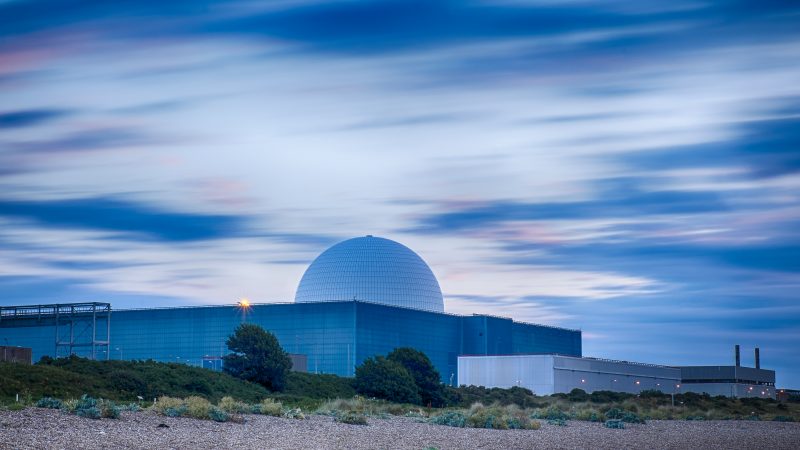
UK adults do not know where Labour stands on nuclear energy, despite party leader Keir Starmer recently declaring at Prime Minister’s Questions that “Labour is pro-nuclear”, exclusive polling by Savanta ComRes for LabourList shows.
New research has found that a total of 21% of UK adults believe Labour is pro-nuclear (5% “very pro” and 16% “somewhat pro”), while a combined 20% think Labour is anti-nuclear energy (7% “very anti” and 13% “somewhat anti”).
A further 22% indicated in the poll that they consider Labour to be “neutral on nuclear energy”. The largest proportion, at 37%, said they did not know the answer to the question. The results suggest that Brits are unaware of Labour’s stance.
When Boris Johnson said at PMQs he was “delighted to welcome [Labour] now into the fold” of parties backing nuclear energy, Starmer hit back: “Come off it! Labour is pro-nuclear. This Prime Minister can’t get a single brick laid of a new nuclear plant.”
Labour supported the nuclear energy (financing) bill in parliament last year, siding with those who say nuclear energy is needed to achieve the UK’s net zero goals and provides steady low-carbon energy that will balance future supply.
“Even on a conservative estimate, we need at least two more large scale nuclear power stations beyond Hinkley C to reach our net zero goals,” Prospect senior deputy general secretary Sue Ferns wrote in a LabourList piece in November.
“Labour’s perceived ambivalence towards nuclear power has been a factor in the recent loss of seats such as Workington, Barrow and Furness, Ynys Môn and Hartlepool. In fact, following the Hartlepool by-election loss, there are now no nuclear power stations represented by Labour MPs,” the trade union official said.
The new Savanta ComRes poll for LabourList indicates that the Conservative Party is seen by significantly more people as pro-nuclear energy, with 40% describing it as such and only 9% saying the ruling party was anti.
The Liberal Democrats were seen by 14% as pro and 23% as anti, according to the research. Its policy is to accept that new nuclear power stations can play a limited role in electricity supply but only if they can be built without public subsidy.
Along with the SNP and Green Party, the Lib Dems opposed the nuclear energy (financing) bill. Former Labour leader Jeremy Corbyn also voted against the bill at second reading, as did Clive Lewis, John McDonnell and Bell Ribeiro-Addy.
YouGov polling in October 2021 showed that two thirds of adults (65%) believe nuclear should play a role in Britain’s climate change strategy, including one in three who say it should play a major role on a par with solar and wind.
Below are the results of the latest polling by Savanta ComRes for LabourList.
To what extent do you consider each of the following political parties pro or anti-nuclear energy?
Labour:
Very pro-nuclear energy – 5%
Somewhat pro-nuclear energy – 16%
Neutral on nuclear energy – 22%
Somewhat anti-nuclear energy – 13%
Very anti-nuclear energy – 7%
Don’t know – 37%
Sum: pro – 21%
Sum: anti – 20%
Conservative:
Very pro-nuclear energy – 13%
Somewhat pro-nuclear energy – 27%
Neutral on nuclear energy – 17%
Somewhat anti-nuclear energy – 5%
Very anti-nuclear energy – 4%
Don’t know – 35%
Sum: pro – 40%
Sum: anti – 9%
Liberal Democrats:
Very pro-nuclear energy – 4%
Somewhat pro-nuclear energy – 10%
Neutral on nuclear energy – 22%
Somewhat anti-nuclear energy – 14%
Very anti-nuclear energy – 9%
Don’t know – 41%
Sum: pro – 14%
Sum: anti – 23%
Green Party:
Very pro-nuclear energy – 4%
Somewhat pro-nuclear energy – 9%
Neutral on nuclear energy – 12%
Somewhat anti-nuclear energy – 13%
Very anti-nuclear energy – 30%
Don’t know – 32%
Sum: pro – 13%
Sum: anti – 43%
Polling by Savanta: ComRes for LabourList. Fieldwork conducted 11th-13th March 2022. Poll of 2,192 adults in the UK.




More from LabourList
‘Tackling poverty should be the legacy of Keir Starmer’s government’
‘The High Court judgment brings more uncertainty for the trans community’
‘There are good and bad businesses. Labour needs to be able to explain the difference’